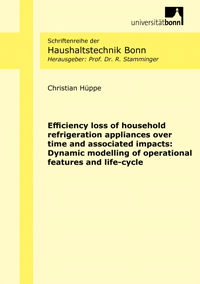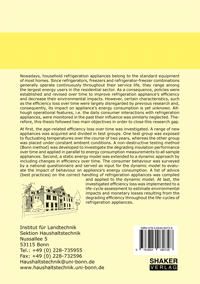
Shop : Details
Shop
Details
45,80 €ISBN 978-3-8440-8072-8Softcover150 pages45 figures222 g21 x 14,8 cmEnglishThesis
June 2021
Christian Hüppe
Efficiency loss of household refrigeration appliances over time and associated impacts: Dynamic modelling of operational features and life-cycle
Nowadays, household refrigeration appliances belong to the standard equipment of most homes. Since refrigerators, freezers and refrigerator-freezer combinations generally operate continuously throughout their service life, they range among the largest energy users in the residential sector. As a consequence, policies were established and revised over time to improve refrigeration appliance’s efficiency and decrease their environmental impacts. However, certain characteristics, such as the efficiency loss over time, were largely disregarded by previous research and, consequently, their impact on appliance’s energy consumption is yet unknown. Although operational features, i.e. daily consumer interactions with refrigeration appliances, were monitored in the past their influence on appliance’s degrading efficiency was similarly neglected. Two main objectives were addressed in order to close these research gaps.
At first, the age-related efficiency loss over time was investigated. A range of new appliances was acquired and divided in two test groups. One test group was exposed to fluctuating temperatures over the course of two years, whereas the other group was placed under constant ambient conditions. A non-destructive testing method () was developed to investigate the degrading insulation performance and applied in parallel to energy consumption measurements to all sample appliances. This way, both changes in insulation properties and consumption patterns were evaluated. Second, a static energy model was extended to a dynamic approach by including changes in efficiency over time. The consumer behaviour was surveyed by a national online-questionnaire and served as input for the dynamic model to evaluate the impact of behaviour on appliance’s energy consumption. A list of advice () on the correct handling of refrigeration appliances was compiled and applied to the dynamic model. The comparison between the real-life consumer behaviour and the determined the share of behaviour in appliance’s energy consumption. At last, the investigated efficiency loss was implemented to a life-cycle assessment to estimate environmental impacts and monetary losses resulting from the degrading efficiency throughout the life-cycles of refrigeration appliances.
At first, the age-related efficiency loss over time was investigated. A range of new appliances was acquired and divided in two test groups. One test group was exposed to fluctuating temperatures over the course of two years, whereas the other group was placed under constant ambient conditions. A non-destructive testing method () was developed to investigate the degrading insulation performance and applied in parallel to energy consumption measurements to all sample appliances. This way, both changes in insulation properties and consumption patterns were evaluated. Second, a static energy model was extended to a dynamic approach by including changes in efficiency over time. The consumer behaviour was surveyed by a national online-questionnaire and served as input for the dynamic model to evaluate the impact of behaviour on appliance’s energy consumption. A list of advice () on the correct handling of refrigeration appliances was compiled and applied to the dynamic model. The comparison between the real-life consumer behaviour and the determined the share of behaviour in appliance’s energy consumption. At last, the investigated efficiency loss was implemented to a life-cycle assessment to estimate environmental impacts and monetary losses resulting from the degrading efficiency throughout the life-cycles of refrigeration appliances.
Keywords: refrigeration appliances; energy consumption; test method; insulation; consumer behaviour; dynamic modelling
Available online documents for this title
DOI 10.2370/9783844080728
You need Adobe Reader, to view these files. Here you will find a little help and information for downloading the PDF files.
Please note that the online documents cannot be printed or edited.
Please also see further information at: Help and Information.
Please also see further information at: Help and Information.
| Document |  | Abstract | ||
| Type |  | |||
| Costs |  | free | ||
| Action |  | Download the file | ||
| Document |  | Document | ||
| Type |  | |||
| Costs |  | 34,35 € | ||
| Action |  | Purchase in obligation and download the file | ||
| Document |  | Table of contents | ||
| Type |  | |||
| Costs |  | free | ||
| Action |  | Download the file | ||
User settings for registered online customers (online documents)
You can change your address details here and access documents you have already ordered.
User
Not logged in
Export of bibliographic data
Shaker Verlag GmbH
Am Langen Graben 15a
52353 Düren
Germany
Am Langen Graben 15a
52353 Düren
Germany
Mon. - Thurs. 8:00 a.m. to 4:00 p.m.
Fri. 8:00 a.m. to 3:00 p.m.
Fri. 8:00 a.m. to 3:00 p.m.
Contact us. We will be happy to help you.



